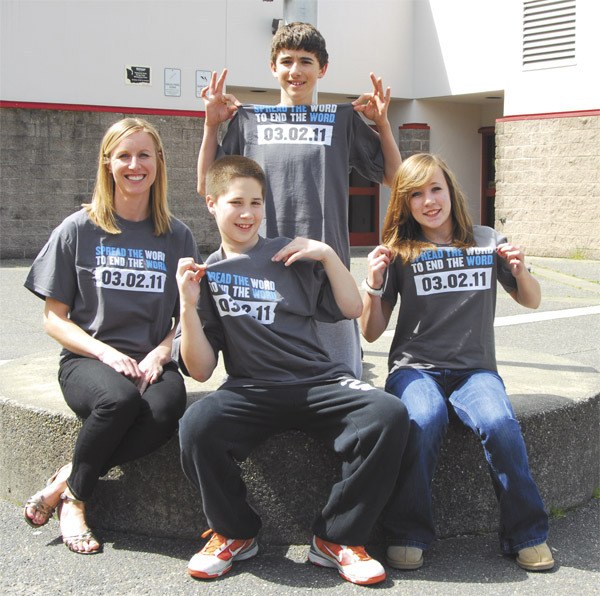In their efforts to end the use of one word, the eighth grade ASB students at Chief Kanim Middle School may have invented a new one.
“It’s probably pretty legical,” said Troy Chriest, thinking out loud.
Or, in words that we already know, it’s probably something that will become part of his legacy at CKMS.
Not just his legacy, either, but that of fellow ASB members McKenzie Popp and Brandon Barnard, as well.
The three are working together on “Spread the word to end the word,” a national campaign launched by the Special Olympics (www.r-word.org). The word they hope to eliminate from Chief Kanim, and maybe the other two middle schools in the district, is “retarded.”
“The word retarded is disrespectful, and… we need to start using some more respect,” explained Chriest.
“I don’t think it’s a bullying issue,” said Popp, who initially brought the idea to Barnard and Chriest after hearing her soccer coach talk about it. “I just think people don’t realize that, when they’re saying it, they’re saying it’s a bad thing to be mentally challenged.”
“Yeah, they weren’t saying it to be rude,” added Barnard.
ASB advisor Catherine Fredenburg agrees, and although she doesn’t allow the word in her classroom, she said “in the halls, you hear it, and they’re not ever meaning to be disrespectful, it’s just a word in their vocabulary.”
Not as much today, though. Since the students started their campaign, they’ve hosted two assemblies to talk about respect—“the new R-word,” explained Chriest—and what it means to people with disabilities.
“At the second assembly we also had some siblings (of students with disabilities) come up and talk about their brothers and sisters,” said Barnard.
“They just talked about how much fun their brothers and sisters are, and how much joy they bring their families,” Popp added.
“And how they’re not really different from us, they just have a disability,” said Chriest.
Following the assemblies, Chief Kanim students were invited to sign a pledge, promising not to use the word. The 300-plus teens who signed the pledge received a rubber bracelet to wear, as a reminder of their pledge. ASB students got T-shirts announcing the value of respect and diversity.
Student response so far has been “mostly pretty good,” said Chriest, although a few students have openly disagreed with the campaign.
“They just think, ‘oh, I’m not using it in a mean way,’” said Popp.
What limited opposition they’ve encountered has not been a challenge for any of the students. “I think it would be a lot harder to be one of the people who had siblings, and they just got up there and shared,” said Barnard.
Popp admits that it’s been easier for the three of them to launch the campaign since they’re “at the top of the school,” and doubts she’d have much success starting the campaign next year as a freshman.
Until then, though, there are two more middle schools to get involved. “If we can get Snoqualmie Middle School and Twin Falls on board, that’s a pretty good legacy,” said Barnard.
“The only way this is going to work is if other kids start to participate,” Popp concluded.



